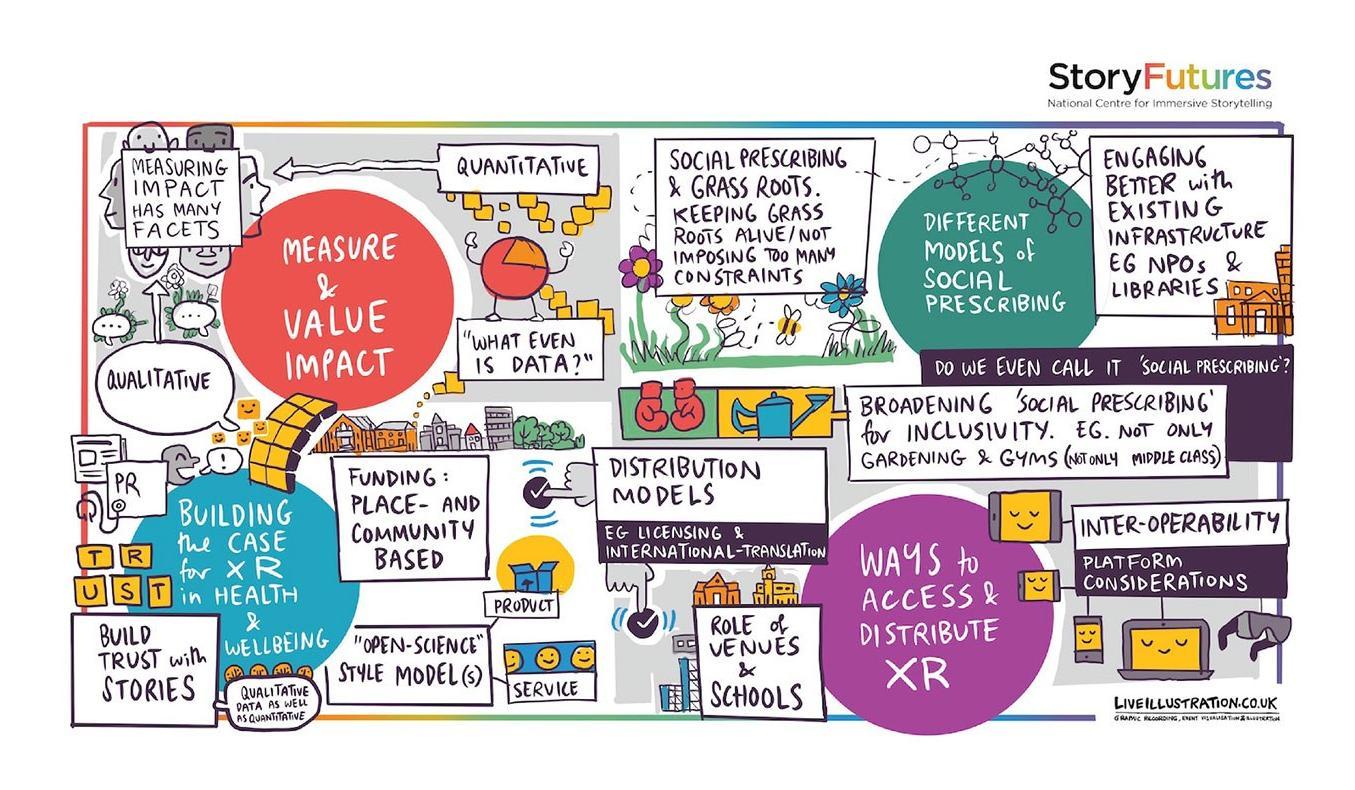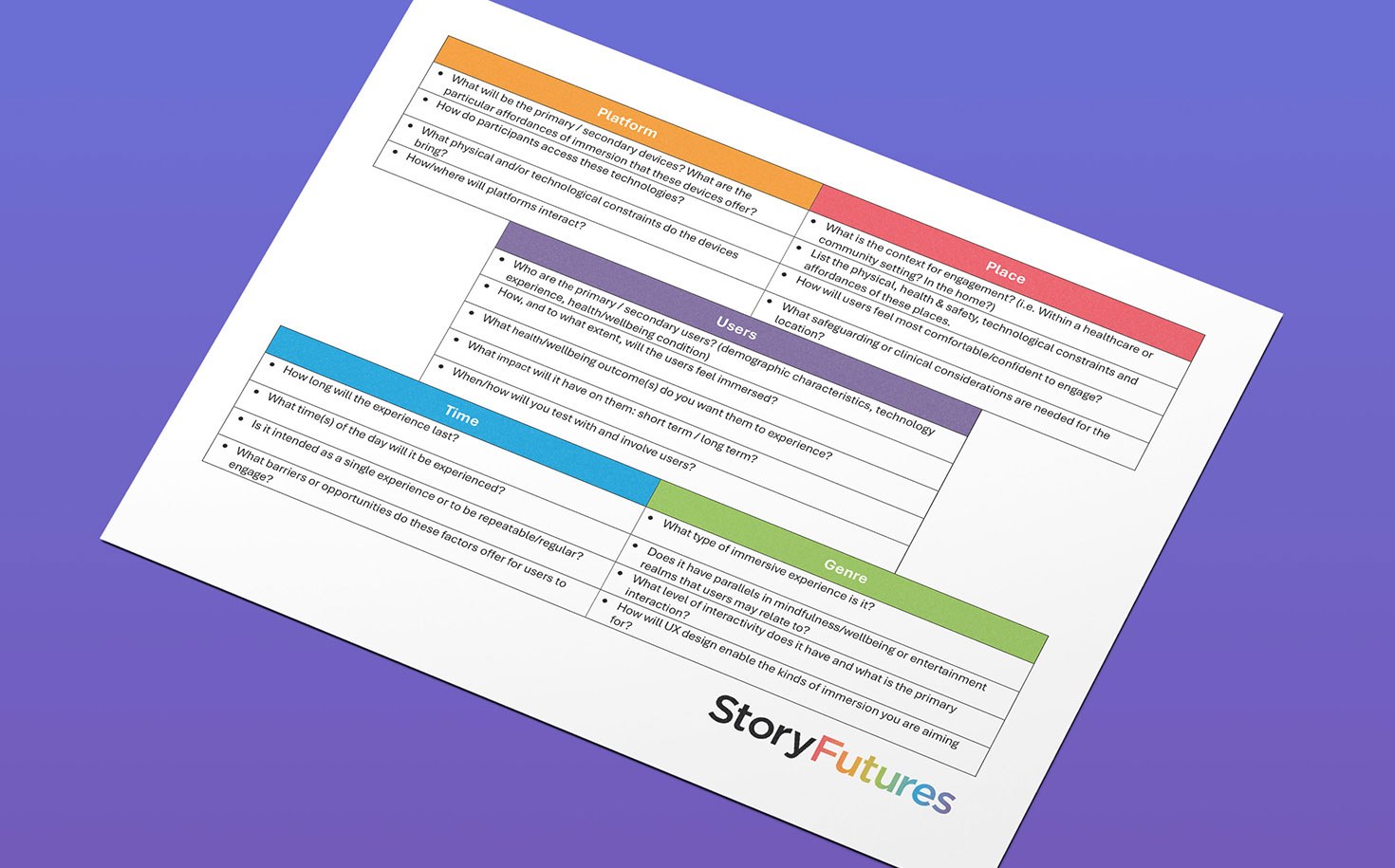ConnectXR Audience Insight & Toolkit

The ConnectXR Toolkit developed by StoryFutures and the Department of Health Studies Royal Holloway, University of London in a ground-breaking Research & Development (R&D) collaboration with the Royal Borough of Windsor and Maidenhead, explores the role that next generation technologies can play in enhancing people’s lives.
5 June 2024
Watch StoryFutures ConnectXR Toolkit Launch:
ConnectXR is a StoryFutures innovation programme, which designed and tested a new innovation pathway for creative enterprises to create XR in health and wellbeing solutions from development to implementation. The programme was designed as a pilot to meet the ambitions of XR creative enterprises, creating health and wellbeing solutions, to establish new routes to audiences through distribution with community assets, in this case libraries.
StoryFutures' StoryTrails project and subsequent partnerships with Meta and the BFI, resulted in ongoing collaborations with 17 libraries and 7 arts hubs and cinema venues in the UK, demonstrating that libraries and cinemas can play a key role in the successful engagement of communities in XR experiences.
ConnectXR explored the challenges and opportunities facing creative XR enterprises when navigating the essential and complex network of health and community stakeholders needed to support the delivery of XR in health solutions in libraries.
While creative companies are adept at creating engaging experiences, the direction and input from health services remain essential. This is where the innovation pipeline at the heart of Connect XR plays a critical role in bringing together the creative spark of these companies with the practical, health-focused insights of healthcare professionals.
Audience data is ordinarily hard to access yet critical in building the health economics needed to attract funding and support. Through an open competition, "Soul Paint", a VR application exploring physical and emotional wellbeing by the creative UK SME Hatsumi and its production partner Monobanda, was selected for a 2-week library pilot, during which audience research was conducted.
Findings demonstrated that Maidenhead Library, as a strong community hub, was an appropriate setting for this type of innovation. Users of a wide range of ages and technical ability found it to be enjoyable, interesting and suitable. A large majority indicated they would repeat the experience and recommend it to others. There was a strong positive impact on wellbeing, through the opportunity to take time for reflection and to connect with others. Older users found the opportunity to try something new to be enriching and valuable.
The pilot demonstrated that establishing a shared innovation pipeline is essential and effective in ensuring the development of high quality XR in health solutions, and that the involvement of the right stakeholders is not only critical to community deployment, but ensures delivery is aligned with local healthcare needs.
Our lessons learned span the importance of networking, training, relationship building, engagement with communities, strong host support and careful planning of the audience journey.
Connect XR broke new ground in building the key relationships needed for successful deployment of XR in health solutions within community assets. But more needs to be done to further test and explore this model to ensure it is a viable and sustainable route for Creative XR SMEs to innovate and reach new audiences. The opportunity exists, building on the new momentum within local authorities and integrated care boards, to think creatively about the future role of libraries and XR in health experiences. Greater collaboration between these new partnerships, social prescribing teams and Creative XR SMEs themselves, can generate new and valuable routes of ensuring better health outcomes for all, experienced at the heart of local communities themselves.
Authors
Dr. Laryssa Whittaker, Lecturer in Anthropology of Audiences & StoryFutures User Research Lead
Prof. Alexandra Palombi, Head of Department of Health Studies, Royal Holloway, University of London
Nick Peres, Programme Director, Digital Innovation & National XR Advisor, Torbay and South Devon NHS Trust
Dr. Aislinn Gómez Bergin , Consultant in Digital Health & Transitional Assistant Professor, University of Nottingham
Jodie Pearton, ConnectXR Research Assistant, StoryFutures
Prof. Fiona Kilkelly, Head of Knowledge Exchange, Enterprise & Commercialisation, CoSTAR National Lab
Kylie Bryant, Senior Producer, StoryFutures
Acknowledgements
StoryFutures thanks the following partners who made this project possible:
- Hatsumi & Monobanda
- Royal Borough of Windsor and Maidenhead Council (RBWM)
- Frimley Integrated Care Board
- Maidenhead Library
And the following individuals:
- Professor Helen Pote, Director of Clinical Programmes for Psychological Practitioners – Royal Holloway, University of London
- Destiny Lawrence, Technical & Showcasing Co-ordinator - StoryFutures, Royal Holloway, University of London
- Jesal Dhokia, Partnerships and Community Services Lead – Integrated Care Board – RBWM NHS
- Prince Obike, Social Prescribing Lead / Integrated Care Transformation Senior Manager – RBWM
- Angela Huisman, Local Authority Library Lead – RBWM
- Salma Barakat, Employment Support Team Leader, Revenues, Benefits, Library and Resident Services – RWBM
- Sarah Ticho, Director & Anna Firbank, Producer – Hatsumi
- Betty Denville, Freelance
- Boo Andrea, Founder & Director – Way Studio XR

